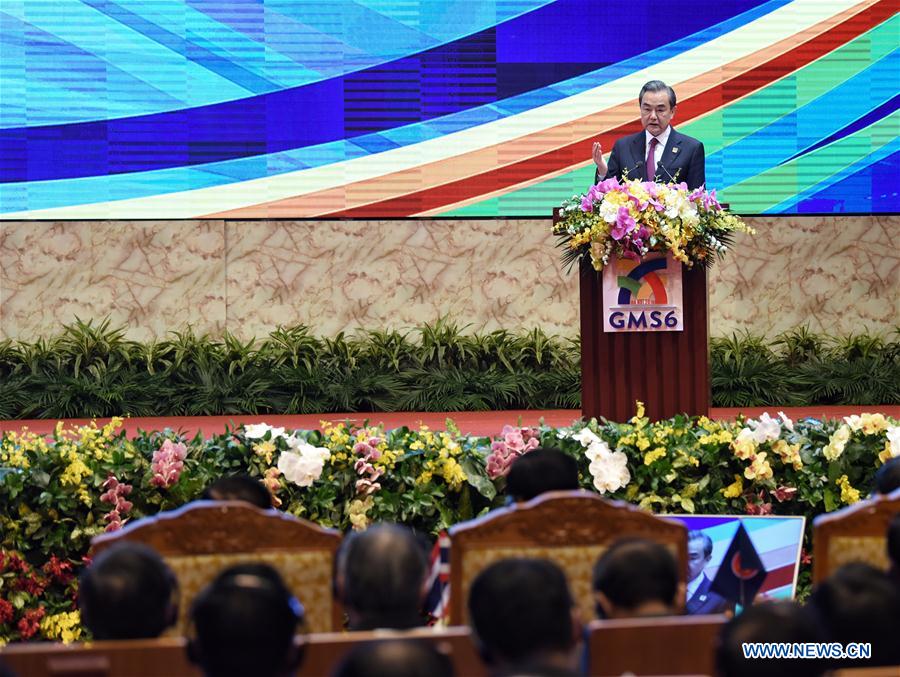
Chinese State Councilor and Foreign Minister Wang Yi speaks during the sixth summit of the Greater Mekong Subregion (GMS) Economic Cooperation in Hanoi, Vietnam, March 31, 2018. (Xinhua/Wang Shen)
HANOI, March 31 (Xinhua) -- Chinese State Councilor and Foreign Minister Wang Yi on Saturday called on countries in the Greater Mekong Sub-region (GMS) to seize opportunities and break new ground for the cooperation and development in the sub-region.
Addressing the 6th GMS Summit, Wang noted that over the past 25 years, the six GMS countries have cooperated with and supported each other, sought development paths that suit their national conditions, and advanced toward peace, stability and prosperity.
"We have actively participated in economic globalization, worked together to mitigate the Asian and global financial crises and emerged as a strong driving force for Asia's economic growth," he said.
"Our interests are connected, so are our destinies. With a joint desire to achieve development and prosperity, we must seize the opportunities that come our way and take concrete action to break new ground in the development and cooperation in our sub-region."
The Chinese state councilor said the GMS countries - Cambodia, China, Laos, Myanmar, Thailand and Vietnam - need to foster stronger growth.
"As the world economy is shifting from old to new growth drivers, GMS countries can and must make new strides in tapping new sources of growth," he said. "We can only make our growth more energized and efficient by riding the wave of innovation and change."
Wang stressed the need to support openness in GMS economic cooperation.
"We must continue to drive trade and investment liberalization and facilitation, support the multilateral trading system and promote an open, inclusive and balanced economic globalization that benefits all," he said.
The Chinese state councilor also emphasized the need to improve the network of connectivity in the sub-region.
"China will work with other GMS countries to further harmonize policies, regulations and standards and implement the Cross Border Transport Facilitation Agreement, as these efforts will help us strengthen the weak links in institutional connectivity and build an all-round and multi-dimensional connectivity network," he said.
Wang also called for closer GMS partnership.
"It serves the common interests of all GMS countries to forge a closer partnership for common development and shared prosperity," he said. "It is important that we treat each other with respect and as equals and deal with sub-regional affairs through consultation."
"We must stay development-oriented and pursue win-win and all-win outcomes in cooperation. We must uphold inclusiveness and mutual trust to ensure that our development and cooperation are not affected by turns of events."
According to a blueprint mapped out by the 19th National Congress of the Communist Party of China for China's future development, China will make all-out efforts, in the new era, to pursue high quality development, further deepen its reform and opening-up, and continue to deepen mutually beneficial cooperation with its neighboring countries, Wang said.
Pointing out that GMS countries are natural partners in and primary beneficiaries of the Belt and Road Initiative, he said. "We could synergize GMS cooperation and the Belt and Road Initiative and realize interconnected development through coordinated actions."
China will also further harmonize policies and enhance the synergy between economic corridors to fully leverage their role in boosting the economy so as to build a "more close-knit community of shared destiny" in the sub-region and open a brighter future for the sub-regional development, he said.



